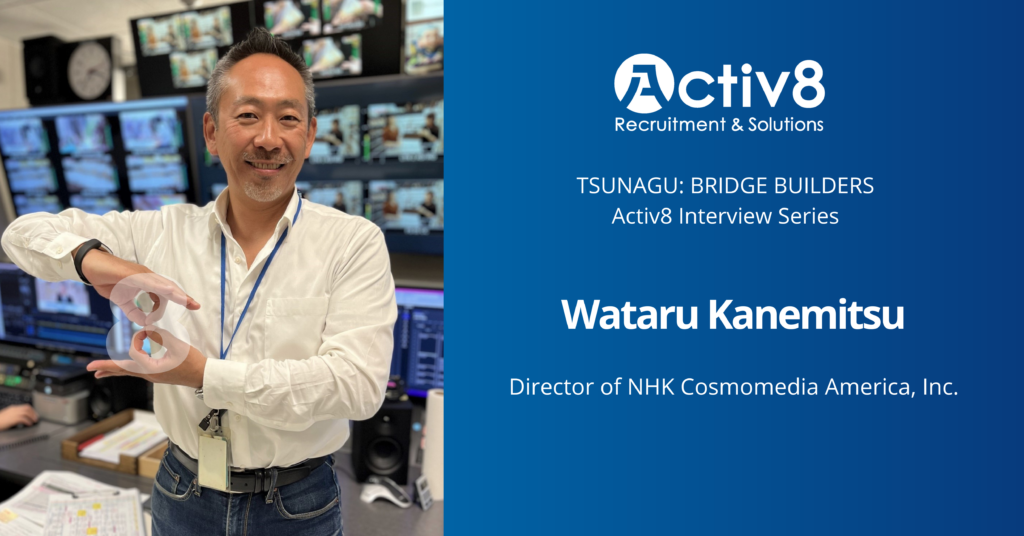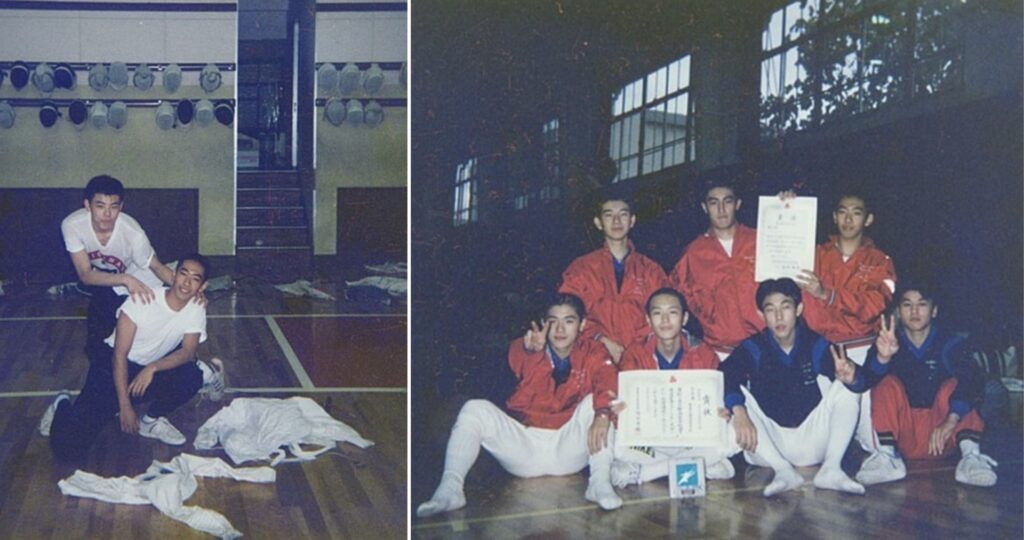TSUNAGU: To Connect: Whether it is connecting employers to job seekers or bringing different cultures together, we at Activ8 value the bridge-builders who make our world a better place every day. Our new series, TSUNAGU, will feature inspirational people who connect North America and Japan through business, education, art, culture and more.
Wataru Kanemitsu: Director of NHK Cosmomedia America, Inc.

Wataru Kanemitsu serves as the Director of NHK Cosmomedia America, Inc., an affiliate of the Japanese broadcasting company NHK, headquartered in New York City. Born in Japan, Kanemitsu moved to the United States in 2000 to study abroad, graduated with a degree in marketing, and has spent over 20 years tirelessly promoting the exchange of information and culture between Japan and the U.S. We spoke with Kanemitsu about his innovative new media distribution service and the key to his success as a seasoned sales professional.
From “TV JAPAN” to “Jme”: A New Era of Japanese Broadcasting in North America
Kanemitsu currently leads sales for Jme, an internet video distribution service launched in spring 2024 for the North American audience. The platform operates under the concept of “Japan & Me – Connecting Japan and Me” and serves as the successor to TV JAPAN, a Japanese broadcasting service that operated for 33 years.
Unlike TV JAPAN, which required subscriptions through cable or satellite TV providers, Jme allows users to access their favorite Japanese content anytime, anywhere, with just an internet connection. The service supports a range of devices, including smartphones, computers, and smart TVs. Jme offers a diverse lineup of content, including six TV channels – one of which streams live 24/7 – and a vast on-demand library of 2,400 titles. This includes dramas that air simultaneously in Japan to cater to the needs of today’s highly mobile audiences, and to build an international community of viewers. Kanemitsu is excited that this innovative service will make Japanese content more accessible and relevant to viewers in North America, and will further strengthen the cultural bonds between Japan and the U.S.
The Journey to the Advertising Industry
Wataru Kanemitsu spent his early years in Sapporo, Hokkaido. During junior high, his family relocated to Tokyo after his father started running a small advertising agency overseeing advertising and promotional campaigns for a department store. His father’s experience as an independent entrepreneur left a lasting impression on the young Kanemitsu. From an early age, Kanemitsu was exposed to the creative world of advertising. His father often shared project storyboards with him, and sought his opinion on catchphrases by asking, “Which one do you think works better?” On occasion, he even brought Kanemitsu to advertising events. Immersed in this environment, Kanemitsu’s interest in advertising grew naturally over time.
Kanemitsu majored in economics in college, but his passion for the creative and dynamic side of advertising guided his career aspirations. Determined to stand out in a field that values originality, he approached job hunting with enthusiasm. One morning, while waiting for a train to attend an interview, he noticed a crowd of students in identical suits. Struck by the uniformity, he realized he, too, was dressed the same way, just another in a sea of suits. The realization hit him hard — he needed to carve his own path rather than conform to convention.
Kanemitsu worked in his father’s advertising agency for two years gaining hands-on experience, but he had long dreamed of deepening his knowledge of advertising and marketing by studying in the United States. His parents named him “Wataru,” meaning “to cross over,” with the hope that he would thrive globally. True to his name, Kanemitsu took the leap, and transferred to a university in New York in 2000 to pursue his education.
The transition was far from easy. The language barrier and cultural differences were more challenging than he had anticipated. During the first three months, the stress and isolation were overwhelming, he felt confined to school, and avoided social interaction. Amid this struggle, Kanemitsu came to deeply appreciate the value of cultural connection as a component of his own identity. The ability to engage with Japanese culture became a source of comfort and enrichment, grounding him in a foreign land, and fostering a sense of belonging.
Skills Required for Sales
After graduating, Kanemitsu began his career at a publishing company in New York before transferring to his current role in sales, where he has remained for 20 years. While advertising sales often evoke an image of glamour and sociability, Kanemitsu admits that he is “an introvert.” Reflecting on his early career, he said, “When I first started working, I was too shy to imagine myself in sales.” So, what enabled him to thrive as a salesperson for two decades? When asked about the skills crucial to his role, Kanemitsu responded thoughtfully, “Sales does not require special qualifications or technical expertise, but the ability to truly listen to people, and ask meaningful questions based on what you hear is invaluable.”
He explained that even in casual conversations with clients, underlying concerns or challenges often emerge. “It’s only by understanding these issues that we can offer the best solutions. To do this effectively, it’s essential to have deep knowledge of the products and services you represent,” he added.
Kanemitsu also emphasized the importance of staying curious and well-informed. “Our clients come from diverse industries, so if we’re not consistently absorbing knowledge—whether it’s industry news, technological advancements, or market trends—we can’t engage meaningfully with them.” This natural curiosity has always been a part of Kanemitsu’s character. Since his student days, he’s enjoyed reading across a wide range of genres and authors, which not only broadened his knowledge, but also shaped his perspectives. His interests extend to physical activities as well; he has explored sports like baseball, basketball, and tennis. In high school, Kanemitsu devoted three years to fencing, a sport he described as “the chess of the sports world.” Through fencing, he honed skills like quick reflexes, physical endurance, keen observation of opponents, strategic insight, and logical thinking—attributes that have proven valuable in client communication.
Kanemitsu concluded, “Sales is a profession that requires comprehensive ‘human skills.’ It’s not just about the knowledge and experience you accumulate, but also about the interpersonal skills and empathy you cultivate along the way.”
 Photos: Wataru Kanemitsu’s high school days
Photos: Wataru Kanemitsu’s high school days
Carrer Advice
When asked what advice he would offer to those starting or navigating their careers, Kanemitsu shared, “Never hesitate to try. Whether you’re seeking your first job or transitioning to a new one, stepping into an unfamiliar world can feel daunting. But if you summon the courage to take that first step, you’ll discover new opportunities and perspectives. And along the way, you’ll find people who are willing to support and guide you.”
Kanemitsu also emphasized the importance of staying alert and informed, or as he put it, “always keeping your antenna up.” He elaborated: “In this era of rapid technological advancements, the concept of a ‘singularity,’ where artificial intelligence surpasses human intelligence, is approaching. With AI driving automation and efficiency, many traditional jobs may disappear. However, this shift also highlights the importance of fields where human creativity thrives. These are areas with immense potential.”
 Photos: Wataru Kanemitsu loves to cook.
Photos: Wataru Kanemitsu loves to cook.
He related this concept to his love for cooking, a highly creative endeavor. “Cooking involves designing menus and crafting meals with creativity and resourcefulness,” he explained. Reflecting on his own job-hunting experience, Kanemitsu recalled how his creative skills, such as designing flyers with Illustrator and Photoshop, helped him stand out. “In my work, I’ve felt immense joy and fulfillment when my creativity brought an idea to life, like launching a program I had planned,” he added. Kanemitsu emphasized the need to continually develop skills aligned with the times, particularly in creative fields.
Future Prospects
Looking ahead, Kanemitsu expressed his hopes for the future of Jme. “I want Jme to become more widely recognized. It carries forward the mission of TV Japan by delivering reliable information, useful insights and entertainment to Japanese residents in North America. I hope we can continue to acquire content that resonates with a broader audience, bringing joy to even more viewers.”
There are many illegal streaming platforms, but Kanemitsu was proud that Jme offers the highest quality programming and is legally available. “With Jme, viewers can access information and entertainment with peace of mind,” he noted. Finally, when asked about the person who has had the greatest influence on his career, Kanemitsu’s answer was heartfelt: “My father. He consistently showed me the power of making people happy through his work.”
Carrying forward his father’s philosophy, Kanemitsu remains committed to being a bridge between Japan and the United States. His determination and vision drive his efforts, and his journey inspires many. We look forward to his continued success.
Related Website:
Jme‘s official website: http://www.jme.tv

